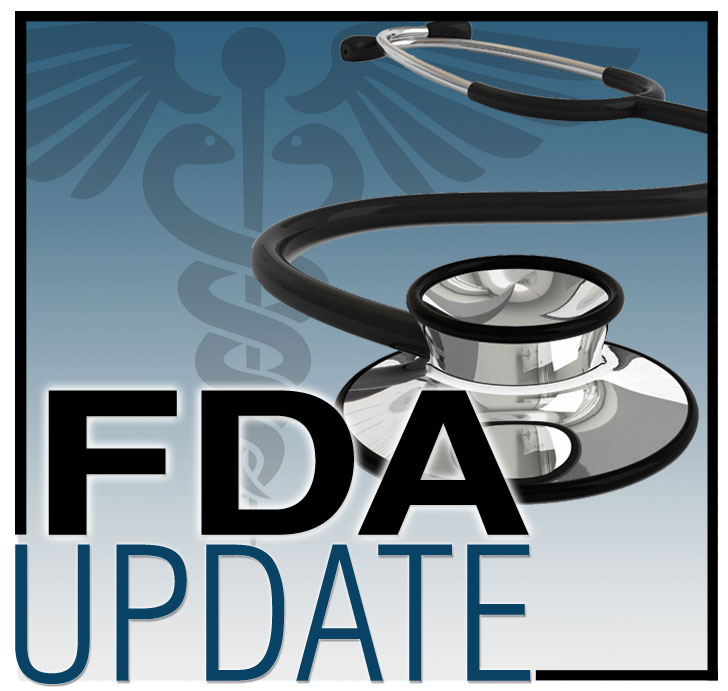FDA Broadens Afatinib Indication to Previously Untreated, Metastatic NSCLC

On January 12, 2018, the U.S. Food and Drug Administration (FDA) granted approval to afatinib (Gilotrif®) for a broadened indication in first-line treatment of patients with metastatic non-small cell lung cancer (NSCLC) whose tumors have non-resistant epidermal growth factor receptor (EGFR) mutations as detected by an FDA-approved test.
Approval was based on demonstration of durable responses in a subset of 32 afatinib-treated patients with metastatic NSCLC harboring non-resistant EGFR mutations (S768I, L861Q, and/or G719X) other than exon 19 deletions or exon 21 L858R substitutions enrolled in one of three clinical trials (LUX-Lung 2 [NCT00525148], LUX-Lung 3 [NCT00949650], and LUX-Lung 6 [NCT01121393]).
Non-resistant EGFR mutations were identified using either Sanger sequencing or by the therascreen® EGFR RGQ PCR Kit. EGFR mutations included in the non-resistant subgroup demonstrated inhibition of cellular proliferation in EGFR-mutant dependent cell lines at clinically relevant concentrations of afatinib. All patients in the subgroup received afatinib 40 mg or 50 mg orally once daily.
The confirmed overall response rate, as assessed by independent radiology review, was 66% (95% confidence interval 47, 81). Among the 21 responders, the proportion of patients with response duration of ≥12 months was 52% and the proportion with response durations of ≥18 months was 33%.
The most common adverse reactions reported for afatinib (≥20%) across clinical trials are diarrhea, rash/acneiform dermatitis, stomatitis, paronychia, dry skin, decreased appetite, nausea, vomiting, and pruritus.
The recommended dose of afatinib is 40 mg orally, once daily.
Full prescribing information is available (https://www.accessdata.fda.gov/drugsatfda_docs/label/2018/201292s014lbl.pdf).
FDA initially approved afatinib in 2013 for the treatment of patients with metastatic NSCLC whose tumors have EGFR exon 19 deletions or exon 21 (L858R) substitution mutations as detected by an FDA-approved test and in 2016 for metastatic, squamous NSCLC progressing after platinum-based chemotherapy.
FDA granted priority review and orphan drug designation to afatinib. A description of FDA expedited programs is in the Guidance for Industry: Expedited Programs for Serious Conditions-Drugs and Biologics (http://www.fda.gov/downloads/drugs/guidancecomplianceregulatoryinformation/guidances/ucm358301.pdf).
Healthcare professionals should report all serious adverse events suspected to be associated with the use of any medicine and device to FDA’s MedWatch Reporting System by completing a form online (http://www.fda.gov/medwatch/report.htm), by faxing (1-800-FDA-0178) or mailing the postage-paid address form provided online, or by telephone (1-800-FDA-1088).
Follow the Oncology Center of Excellence on Twitter @FDAOncology (http://www.twitter.com/@fdaoncology).
Check out recent approvals at the OCE’s podcast (http://www.fda.gov/DISCO), Drug Information Soundcast in Clinical Oncology (DISCO).
In collaboration with the FDA and as a service to our members, ONS provides updates on recent FDA approvals and other important FDA actions (e.g., updated safety information, new prescribing information) pertaining to therapies for patients with cancer. This allows the agency to inform oncologists and professionals in oncology-related fields in a timely manner. Included in the FDA updates is a link to the product label or to other sites for additional relevant clinical information. In supplying this information, ONS does not endorse any product or therapy and does not take any position on the safety or efficacy of the product or therapy described.
